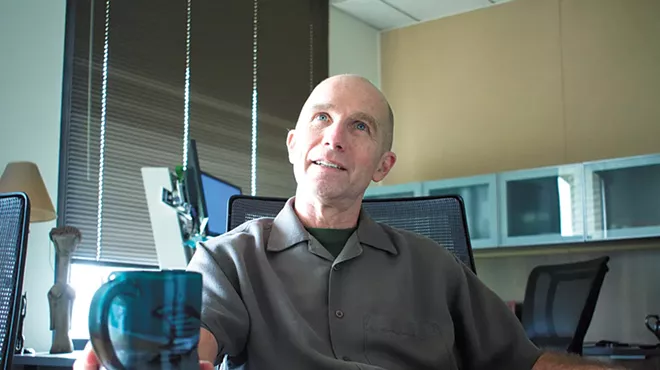When the news broke on Friday that the Spokane Regional Health District's health officer, Dr. Bob Lutz, had been asked to resign by Administrative Officer Amelia Clark, community members reacted with anger, shock and confusion.
But Kyle Unland, the Health District's former division director of health

Unland was ousted from the agency in February, with Clark eliminating his position entirely through an abrupt reorganization. That ouster had come mere days after Unland had raised concerns with HR, alleging that, as a White male, he had been discriminated against because of his gender and race.
His lawsuit highlights that it's not just who the Health District lays off or terminates — it's how.
For a decade, Unland had been the division director of health promotion, a division that tried to spread information about everything from healthy eating to elderly falls. He had experience grant-writing, overseeing 50 employees, and handling a multi-million dollar budget. His resume touted two additional decades working for health departments in Grays Harbor, Thurston County, and the state of Washington.
And so in 2019 when the district kicked off a national search for the district's new administrator, he thought he had a decent shot. But while Unland was in the top seven, by the time it had been winnowed down to four, he'd been eliminated.
He didn't get the job. Amelia Clark did.
He says he tried to figure out what had happened, reaching out to human resources, the Health District board, and the firm that had conducted the search, only to be stonewalled. But eventually, he says, he began to suspect that he had been discriminated against, that the fact that he was a White male had been counted against him.
Unland, who used to lead the district's equity team, says he understands the concept of "White privilege." He knows that not a lot of people are going to shed many tears that a White dude didn't get a job he wanted.
Nationally, there are examples of successful lawsuits centered on White people who alleged they were discriminated against because of their race.
But Unland might be hard-pressed to prove discrimination in this case. His argument rests on the allegations that the four applicants who received in-person interviews, including three women and a Hispanic man, were generally less qualified than Unland and the two other White male finalists who didn't. But he'll have to contend with the fact that the two employees who had been acting as the interim administrators before Clark was hired were both White men — as was previous administrator Torney Smith.
Still, being passed over for the job wasn't what triggered Unland's lawsuit: What happened next did. On Jan. 31, he says he raised the possibility he had been discriminated against with the Health District's HR director.
Just two hours after HR told Clark about the complaint, Unland alleges, Clark sent out an email announcing that she was moving up the timeline to reorganize the agency, concluding that she didn't need the Health District board's approval to make her changes.
He was told that because of the reorganization, his position had been eliminated and he was being laid off.
The reorganization had also created new "associate director" positions on the new organizational chart. He asked if he could apply for those.
"This action just doesn't make any sense," Unland responded. "As an agency, we try our hardest to keep valuable and experienced employees in the agency by trying to find them other positions."
Clark allegedly countered by telling him, "I don't know what the agency has done in the past, but this is the direction I'm taking the agency."
Then, Unland claims, he was escorted out of the building without even an opportunity to grab his things.
A request for comment from the Spokane Regional Health District has not been immediately returned. A response filed in court by the Health District disputes the bulk of Unland's account and fervently denies that Unland had been discriminated or retaliated against, though it has not provided much detail.
"They were like 'whaaaat?'" he says. "It was really, really, really impactful for the division. A lot of people were very disturbed by it."
"He’s been part of our executive leadership team for quite a while. He comes with a lot of expertise," Wilson says. "I think it put everybody on edge."
Unland says that while he was there, Clark had pulled away power from the division directors, taking a more unilateral approach.
"She wanted more control," Unland says. "She liked to be in control."
And it's possible that it could be a long time until we learn more. Unland says he and his attorney have been waiting eight months, and still haven't received some of the requested documents related to his termination.
That lack of clarity, he says, has long frustrated district employees.
Public agencies frequently use secrecy around "personnel issues" as a way to shield themselves from lawsuits. But as Unland's case shows, lawsuits often happen anyway.
Samantha Wohlfeil contributed reporting to this story.




























